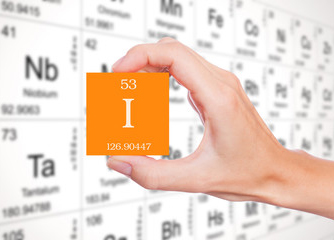Iodine – Uses, Benefits, Sources and Dosage

Iodine is natural occurring nutrient in the body which plays important role in body.
It is important for growth and development. It is essential for the regulation of thyroid hormone which plays role in basic metabolic rate.
Importance of Iodine
Iodine is very important precursor for thyroid hormones. The receptors for iodine is present throughout the body which regulate the cellular metabolism like nutrition into cells and helps to remove toxins from cells.
Functions
It is important for the metabolism of cells. Metabolism means conversion of food into energy. It is important for normal functioning of thyroid gland and regulates the hormone secretions of thyroid gland.
Health Benefits of Iodine
It is required for proper physical development and metabolism in the body.
Some of these are explained below:
- Metabolic rate – Iodine mainly influences the functioning of thyroid gland that secretes different hormones which are responsible for metabolic rate of body. It is the key element in the body which is responsible for maintaining health.
- Energy level – It helps to maintain the energy level in body as per requirement.
- Healthy nails, skin, hair and teeth – It provides healthy skin, hairs, nails and teeth. It is important element for shiny skin, hair and teeth. Deficiency of iodine may result in hair loss.
- Reproductive system – Iodine helps in normal growth and maturity of reproductive system. It is essential during pregnancy, it prevent the complications in newborn babies.
- Immune system strength – It act as immune system booster. Iodine enhances the activity of antioxidants in body and provides a defense mechanism to body and it provides defense against various diseases like heart disease and cancer.
- Hypothyroidism – it is a condition characterized by low activity of thyroid gland. It is associated with the symptoms like increase in weight, fatigue, dry skin, constipation, cramps, swelling. In this case, iodine helps to manage these symptoms.
Food Sources
Normally iodine is taken by consuming a balanced diet.
The common food sources of iron are given below:
- Table salt should be iodized.
- Seafood such as Cod, sea, bass and haddock.
- Kelp
- Dairy products
- Plant grown in iodine rich soil.
Deficiency of Iodine
It is very common in women than men and pregnant women. Deficiency of iodine puts serious effects on body.
The common symptoms associated with the deficiency of iodine include:
- Weight gain
- Mental problems like depression, frustration, mental retardation
- Decreased fertility
- Constipation
- Fatigue
- Physical malformations
Side Effects
Long term deficiency may cause goiter or hypothyroidism. Due to lack of iodine, thyroid gland become enlarged and does not secret thyroid hormones. It is more common in women, pregnancy and older children.
Dose
The best way to fulfill the need of nutrients is to eat a balanced diet that contains a variety of nutrients.
The recommend dose of iodine according to age and sex is given below:
Infants
- 0 to 6 months: 110 micrograms per day (mcg/day)*
- 7 to 12 months: 130 mcg/day*
Children
- 1 to 3 years: 90 mcg/day
- 4 to 8 years: 90 mcg/day
- 9 to 13 years: 120 mcg/day
Adolescents and Adults
- Males age 14 and older: 150 mcg/day
- Females age 14 and older: 150 mcg/day
- Pregnant females of all ages: 220 mcg/day
- Lactating females of all ages: 290 mcg/day



